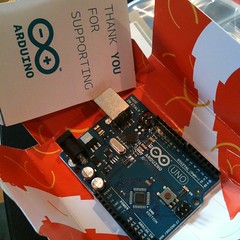Today a report came out from the UK government select committee on Science and Technology looking into the apparent lack of practical science work in schools that will create the next generation of scientists . It is heartening to see that the problem of a lack of practical science in schools has been identified. It is something that I have spoken about and also heard many others publicly express concern over.
It is a little concerning that some of the reporting is suggesting that it is the teachers in schools avoiding doing field trips and hands on science due to health and safety concerns and to curriculum pressure as if it was the teachers that created the league tables, measurement culture and paperwork. Most teachers want to excite and engage students, that is the point of the vocation. It is the policies around schools, the funding models and the generic nature of the curriculum that is the problem.

In the branch of technology that I work in there are plenty of opportunities for hands on practical work, programming, electronics, art, expression, logic etc. Much of what I try and help people with is things that they can just go and do, at relatively low of zero cost. That clearly can’t happen with some of the more physical sciences that require raw materials, or complex instruments but it is all about people getting to do and then share that creates interest. Being told and then measured really is not a sensible approach to inspire people of any generation.
As I wrote a few months ago about the excellent Raspberry PI project “There is also that realisation that developer community is shrinking, the grand masters are getting older, kids are not getting into programming. It’s not really even being taught.”
Whether you regard this as a science or an art or a branch of engineering the skills used in software development and understanding patterns of technology are relatively low cost to engage students with though it does need teachers who are programmers. I think there are few technical experts out there that want to change profession to teach ICT (which is basic use of of packages akin to learning to type). When I started as a programmer our teacher was from the industry, there were some keen hobbyist teachers too, but the main teacher has worked building systems. This, along with self teaching on easily accessible systems, was my grounding when I was in my early teens.
Now we have lots of unusual platforms, Opensim as a virtual world, Minecraft, Little Big Planet, Arduino hardware all available to encourage a generation of hackers, engineers and potential scientists just waiting to be rolled into more common school usage.
What am I doing about that then? Well short of going to train to be a teacher (now there is an idea!) I try and bring these things to the TV and to presentation and conferences, trying to show through practically doing things.
Of course if we miss a generation or two, separating them from technology and science in favour of paperwork we end up with a set of parents who will not be able to share the science with their kids. This in turn will lead to politicians, teachers and educators that also do not have that passion for science and tech. So we have no choice.
I know I gained an appreciation of large scale engineering and the challenges of it from my Dad working building ships. The trades (welding, plating, carpentry, technical drawing and design etc) all blended together into a very tangible and physical experience of what has to come together to make something as impressive as a large ship.
We need to make sure that whilst all the red tape and obsessive measuring is removed from education we keep the interest levels alive so that when the system is ready to enthuse the kids they haven’t given up already.

Leave a Reply